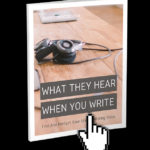“I don’t like to read very much because I don’t want to contaminate my voice.”
I’ll never forget the look on Professor Eric Gansworth’s face when my creative writing classmate announced his stand on the professor’s suggestion that we read a wide variety of sources.
It was actually a lot like this:

Professor Gansworth does not approve.
(Yes, that’s really him)
Here’s the simple fact about voice: You are the collective product of what you read, what you see, and what you hear.
And that’s the cool part!
That’s what makes your voice different than anyone else’s.
So the short answer to “How do I develop my own voice,” is simply:
Learn as much as you can about as much as you can.
The long answer is just a fancy deconstruction of the simple statement above — which we’ll dig into today.
So here it is, the 5 Ways to Develop Voice:
- Stop reading about writing. Read other stuff instead
- Connect the random dots
- Write. A lot. About everything
- Write to a human (ONE human)
- Learn the rules before you break them.
So let’s dig in.
Stop reading about writing. Read other stuff instead
The best way to develop a memorable, unique voice is to read. And yes, there is value to reading about other people’s processes. I love On Writing, Bird by Bird
, and The War of Art
.
But reading about writing (and especially reading blogs about blogging) can be like when a teenage girl asks her peers in the locker room a better way to do her hair. She gets a lot of ideas and most are completely irrelevant.
In the locker room: “OMG, Thanks you guys!!”
At home: Feeling suddenly more overwhelmed and more self-conscience, she falls back to her normal side-ponytail-that-was-supposed-to-be-a-regular-ponytail-but-she-can’t-figure-out-how-to-get-it-straight
[Thanks for watching. This segment of the program was brought to you by… repressed memories!]
Moving right along…
The point is, Google can’t really help you here.
The articles out there are just plain bad. I found advice like “ask your friends how they would describe your voice!”
Please try that and let me know how it works out for you. The answer I would get is “deep” or “manly” because I was genetically blessed with a nice rich baritone voice. The boys like it… until they realize I’m a woman.
Here’s a roundup of the shittiest internet advice about voice:
When your writing feels like work, that’s an indication you’re not being true to your voice
Do you know how long it took me to write this post? I’ll tell you.
Over a month.
Why?
Because writing is work. And I didn’t feel like it some days. There’s kids, and naps, and puppies, and springtime, and chocolate, and Trader Joe’s, and NAPS — all better options than writing. Don’t listen to anyone tell you that once you find your voice, you don’t have to work to write. They lie. There is no work better than writing for this blog. But, it’s still work.
Describe yourself and make sure your writing always sounds like that
I would describe myself as irrationally optimistic — but I’m not always sunshine and rainbows.
Remember we covered in part 1 that your voice/tone will shift depending on the circumstance. If I always wrote about how great writing is, it wouldn’t be honest. (See 2 paragraphs up for an example)
And my personal favorite brought to you by Writer’s Digest:
To set your voice free, set your words free. Set your characters free. Most important, set your heart free. It is from the unknowable shadows of your subconscious that your stories will find their drive and from which they will draw their meaning. No one can loan that or teach you that. Your voice is your self in the story.
All you need to know there, folks.
Voice really comes from ramming ideas and words together in ways that no one else does. And the way to do that is to get a bunch of ideas. That, my friend, comes from reading about weird stuff, meeting weird people, and even best of all, experiencing weird stuff.
Then connecting it all together.
Write. A lot. About everything.
I write for myself every single day. Not for this blog, not for clients, for me.
My favorite “exercise” is one I made up a few years ago. I write stories about people I meet (or don’t meet). That lady at the coffee shop — why is she so sad? That girl doing her hair in the car next to me — is she egotistical or is she on her way to a big date, or a job interview, or…. Did she just have a lunchtime rendezvous and is straightening up before she goes back to work?
What should you write about? Here’s a list to get you started
- Write stories about your day.
- Write a lot of shitty copy.
- Write love letters
- Write hate letters
- Write journal entries
- Write about your past
- Write about your future
- Write poetically about your favorite ice cream
- Write cynically about love
- Write about your dreams for your kids
- Write about what your dog is thinking
- Write fan fiction for your favorite Netflix series
- Write about your customer
- Write scathing reviews about things you hate
After writing pages and pages, you’ll start to fall into a rhythm that’s yours.
You’ll find that you can’t “pick” a voice, you have to find it.
Take that writing and analyze. What’s the tone? What’s the cadence? Run it through a grade-level tool and find your vocabulary level.
Compare it to people you love and people you hate and see where you fall.
Learn the rules before you break them.
If you’re an English teacher, you could probably put red ink all over this post. I use “who” instead of “whom.” I make up words.
I write run ons. And fragments.
In the last post, I accidentally wrote, “doing the dishing” instead of “doing the dishes” and I kinda liked the way it sounded, so I left it.
I just used the word “kinda.”
And that’s ok. That’s part of what makes my voice. But, at the same time, you need to have a basic understanding of the English language so you can be deliberate about those choices. There’s a huge difference between quirky and lazy. Don’t be lazy with your grammar. Find out when you should use “lay” versus “laid” and that “irregardless” is not even a real word. Then use irregardless ironically for effect (not for “affect”).
And yes, I realize that you are at the end of this post and I’ve only covered 3 of the 5 steps to finding your voice. The other two are more involved and include personal details like specific lessons from my mentors, and how my crazy career path laid the foundation for my voice.
Just yesterday, I finished my first book on the topic of…. voice! In it, I include the entire 3-part voice series (the only place the full series is available), worksheets for finding your voice (and others), and an opportunity for free feedback from me.
All you have to do is enter your email below and I’ll send it right over to you.


Referred to you by Brian Kurtz. How do I contact you about copywriting?
Hey Rick,
Thanks for reaching out. I just emailed James from your team. Or you can reach me at abbey@onlifeandwriting.com. Look forward to connecting! – Abbey